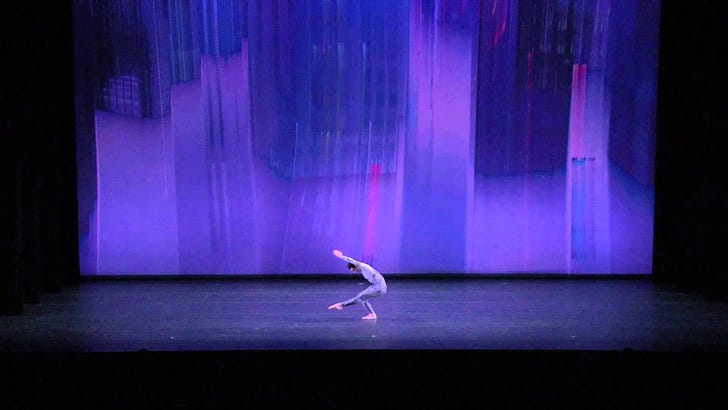Danceletter 19
I have a confession to make: Even though I’ve been writing up recommendations for where to watch dance online, and am excited about the newfound availability of work that I love, I don’t really feel like watching dance online myself. When I try, I feel this emptiness. That might change. But right now, it just makes me miss gathering with people in the same place, at the same time, our attention held by being together and not knowing what will happen next.
This week I rewatched the documentary film Cunningham for my Dance in New York City class. (It’s now available on the internet.) When I saw the opening aerial shot of Manhattan, the bird’s-eye view of dancers on a rooftop, I felt so far from the city, even though I’m right there. Right here. I know this is a common feeling among New Yorkers right now: missing the city we’re in. I even miss the subway, such a reliable source of frustration in my former life. I’m nostalgic for a crowded platform.
I just got up from writing this to open my window and clap for essential workers. (It’s Saturday night.) I thought especially of public transit workers this time. The 7 p.m. clap in my neighborhood has been more robust these past few days. A few nights ago it seemed to stretch for blocks and blocks.
By this point most of us, maybe all of us, know someone who is very sick or who has died from the coronavirus. This is the reality. I want to take a moment to remember a colleague of mine, Tom Waters, who I knew through teaching and union organizing at Barnard. He died on April 4.
I didn’t know Tom that well, but I was happy whenever we crossed paths, in real life and on Twitter, where we had a nice rapport. He had been an adjunct in the Barnard Urban Studies program, and in the formative days of our contingent faculty union, he showed up to just about everything: protests, rallies, teach-ins, meetings, negotiations, Labor Board hearings. The long and tedious events as much as the fun ones.
Tom was involved in these efforts before I was, and stayed involved even when he moved on from teaching at Barnard. I admired his steadiness, how he seemed to know the importance of simply being present. As someone much newer to organizing, I learned from that example. He had a kind and mellow energy and took an interest in my work. I wish I had taken a deeper interest in his when I could have talked to him about it. Since he passed, I’ve learned more about his research on affordable housing and his advocacy on behalf of low-income New Yorkers. It’s hard to believe he is gone.
We are all in mourning, mass mourning. I don’t really know how to do this, or how to write about it, what to say. Whether to say anything. I go about my day, sheltered, sometimes as if everything’s all right. Spells of forgetting. And then a new flood of awareness of the scale of the loss. People I know and people I didn’t. The city slipping away.
It is hard to stay hopeful. In the midst of this all, I am grateful for conversations with people who aren’t giving up, not even close, who are committed to imagining and building a way forward. Recently I spent time talking with the poet and performance artist Jaamil Olawale Kosoko about the possibility, in his words, of “changing the future.” You can read here (or in today’s newspaper) about his work, in particular the “global gesture in listening” he has planned for April 22, Earth Day. I will be tuning in.
The class I taught this week was about Merce Cunningham (what brought me to those city views in Cunningham, the film). I didn’t realize until the day before that I had scheduled the class for his 101st birthday. Turns out, it was a good time to check in with Merce: to be reminded of his tireless pursuit of new possibilities and his conviction, relayed through movement, that what may seem impossible is not. You might have seen this one before: Silas Riener in Split Sides, performed in 2011.



